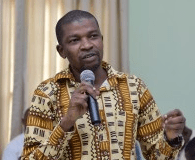By Samuel SAM
Northern Ghana Civil Society Organisations (CSOs) have held a coordination forum in Tamale, with a call on Non-Governmental Organisations (NGOs) to collaborate through mutual partnerships for sustainable development project implementation that addresses community needs.
Such collaborations will help to avoid project duplication and curb of waste of resources, while ensuring all communities have access to equal opportunity in resource allocations would go a long way to effect development interventions in the regions that alleviate poverty.
The event – organised by star Ghana Foundation in partnership with Ghana Developing Communities Association (GDCA), Oxfam in Ghana, ActionAid Ghana, Norsaac, Sung Foundation, School for Life among others – aimed at bringing together stakeholders to strategise on mutual partnerships for sustainable development projects in addressing communities’ infrastructure deficits for economic growth and also toward achieving the Sustainable Development Goals (SDGs) in Ghana.
The forum – held under the theme ‘Enhancing Coordination and Mutual Accountability in Northern Ghana’ -to strengthen collaboration among CSOs operating in Northern Ghana and address key developmental challenges – brought together stakeholders from Non-Governmental Organisations (NGOs), academia, research institutions, media and tradional authorities among others.
Since its inception in 2021, the Northern Ghana CSOs Forum has provided a unique platform for CSOs to share experiences, discuss challenges and chart a path toward inclusivity and strategic partnerships that promotes sustainable development.
This year’s edition focused on enhancing effective coordination and partnerships, especially given dwindling funding support for CSOs.
Country Director-Oxfam in Ghana, Mr. Mohammed-Anwar Sadat Ada said: “For decades, well-meaning interventions have been implemented in the north, from government programmes to donor-funded initiatives, from NGOs to private sector ventures, but too often these efforts operate in silos”.
According to him, many projects suffered from weak monitoring and evaluation systems, resulting in fragmented and duplicated efforts within communities and the partnership will help to ensure value for money and projects.
“We must resist the temptation of short-term wins. True sustainable development requires patience, persistence and participation. It calls for systemic change, not just service delivery. We must strive to build resilient institutions and empowered communities,” he said.
Executive Director-Norsaac, Alhaji Mohammed Awal Alhassan, stressed the need for mutual project development to avoid any duplication.
He commended STAR Ghana for convening the forum to enable NGOs identify issues affecting communities and ways of ensuring effective implementation for CSO interventions in Northern Ghana.
Executive Director of GDCA and Chairman of the Planning Committee of the Forum, Alhaji Osman Abdel-Rahman, said ensuring a sustainable framework for mutual accountability and advocacy will help to champion developmental projects; thereby making sure resources allocated for projects are used for the correct purposes.
NGOs in the region have contributed tremendously to alleviating poverty – but the resource allocation due individual organisation’s projects was seen at specific communities while others were denied, hence the need for collaboration.
We need to analyse implications of the shrinking funding landscape in Northern Ghana and identify innovative strategies for securing alternative funding sources, he said.
He added that the forum also sought to gather collective CSO perspectives to influence the ongoing constitutional review process.
He emphasised that: “We are hopeful that by the end of this forum we will have elected delegates for the Governing Body of the Ghana Civil Society Forum, who will monitor the implementation of government policies and programmes”.
Mr. Frederick Nuuri-Teg, Northern Ghana Projects Manager-STAR Ghana Foundation, said although many CSOs operate in Northern Ghana, their interventions often lack coordination – leading to mismatches in development outcomes.
He said the forum was meant to address such gaps and help maximise the impact of CSOs in local communities.










